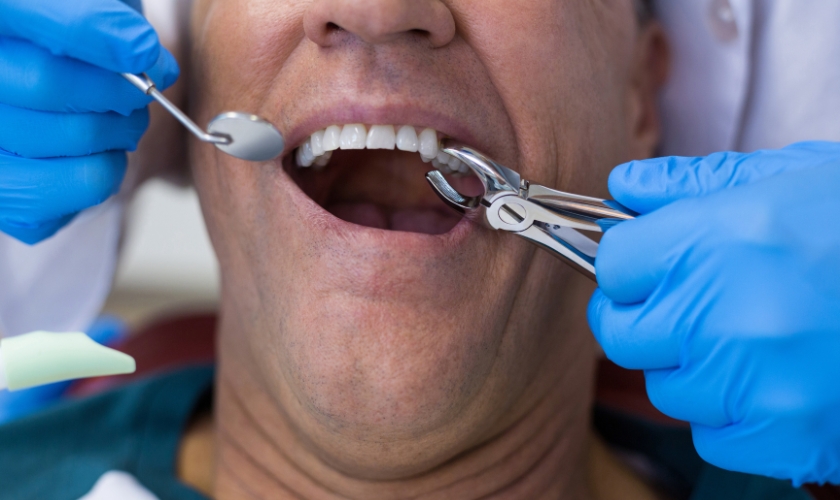1930 E. Rosemeade Pkwy #103 Carrollton, TX 75007


After undergoing a tooth extraction, it’s natural to experience discomfort and swelling around the extraction site. While pain relief is essential for recovery, there are specific reasons why dentists advise against taking ibuprofen, a commonly used nonsteroidal anti-inflammatory drug (NSAID), immediately after the procedure. In this article, we delve into the reasons behind this recommendation, alternative pain management strategies, and when it may be safe to resume ibuprofen use post-extraction.
Understanding Tooth Extraction
Tooth extraction is a common dental procedure performed for various reasons, including severe decay, infection, crowding, or trauma. After extraction, a blood clot forms in the socket to protect the underlying bone and nerves and promote healing. Disruption of this clot can lead to a painful condition known as a dry socket and delay the healing process.
Role of Ibuprofen in Pain Management
Ibuprofen is widely prescribed or recommended for managing pain and inflammation post-tooth extraction. As an NSAID, it works by inhibiting the production of prostaglandins, chemicals in the body that promote inflammation and pain sensation. By reducing inflammation, ibuprofen helps alleviate discomfort and swelling, facilitating a smoother recovery process.
Why Avoid Ibuprofen Immediately After Tooth Extraction?
- Risk of Bleeding: Ibuprofen and other NSAIDs have blood-thinning effects, which can interfere with the blood clot formation necessary for proper healing after extraction. Inhibiting platelet function can prolong bleeding from the extraction site and increase the risk of complications.
- Potential for Dry Socket: Dry socket (alveolar osteitis) is a painful condition that occurs when the blood clot either fails to form properly or becomes dislodged prematurely from the extraction site. Using ibuprofen too soon after extraction may disrupt the clot, leaving the socket exposed to air, food particles, and bacteria, leading to a dry socket.
- Delayed Healing: Interfering with the initial clot formation can delay the healing process and prolong post-operative discomfort. It is crucial to allow the clot to stabilize and initiate the healing cascade naturally before introducing medications that could compromise these processes.
Alternative Pain Management Strategies
While ibuprofen may not be recommended immediately after tooth extraction, there are alternative pain relief options that dentists often recommend:
- Acetaminophen (Tylenol): Acetaminophen is an effective pain reliever that does not have the same blood-thinning properties as Non-steroidal anti-inflammatory drugs (NSAIDs). It can be safely used post-extraction to manage discomfort.
- Prescribed Pain Medications: In cases of severe pain or complex extractions, dentists may prescribe stronger pain medications for short-term use to manage pain effectively.
- Cold Compresses: Applying ice packs or cold compresses to the outside of the face near the extraction site can help reduce swelling and numb the area, providing temporary relief.
- Saltwater Rinse: A warm saltwater rinse can help cleanse the extraction site and reduce inflammation. It also promotes healing by keeping the area clean of food debris and bacteria.
When Can Ibuprofen Be Safely Used?
Typically, Dr. Flink Carrollton’s dentist advises patients to wait at least 24 to 48 hours after tooth extraction before considering NSAID use, including ibuprofen. By this time, the blood clot should have formed adequately, reducing the risk of complications like dry sockets. However, it’s crucial to follow the specific instructions provided by your dentist based on your individual recovery progress.
While ibuprofen is an effective pain reliever for many dental conditions, its use immediately after tooth extraction is discouraged due to its potential to interfere with blood clot formation and increase the risk of complications like dry sockets. Patients undergoing extraction should follow their dentist’s recommendations for pain management, which may include alternative medications or methods that promote healing without compromising recovery.
By understanding the reasons behind these recommendations and adhering to post-operative care guidelines, patients can ensure a smoother recovery process and minimize the likelihood of complications after tooth extraction. Always consult with your dentist or healthcare provider for personalized advice on managing pain and promoting healing after dental procedures.

